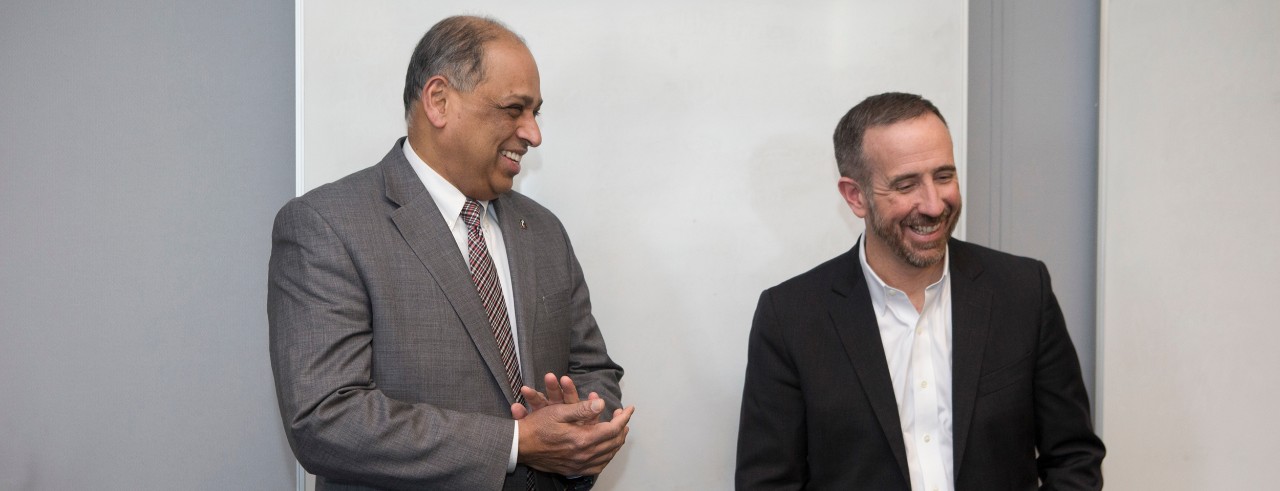
Op-ed: Rembrandt or robot?
Two CEOs explore questions about the digital future
Two of Cincinnati’s leading chief executives – Cincinnati Bell President and CEO Leigh Fox and UC President Neville Pinto – teamed up on a guest column in the Cincinnati Business Courier (essay reproduced below). Their essay points to the need for industry and academia to work together to ask better questions about the accelerating and increasing expansion of technology into the creative realm of humanistic endeavor.
As technology gets smarter, we should too.
Leigh Fox, Neville Pinto
One of the key questions Fox and Pinto pose is: How will Artificial Intelligence (AI) affect and change creative undertakings such as art, music and writing?
In addition to the partnership on writing a guest column, Cincinnati Bell is also a partner to UC in many other ways, including UC's co-operative education program and the company’s innovation center at UC's 1819 Innovation Hub.
CINCINNATI BUSINESS COURIER
Our View: Rembrandt or robot? The next question for our digital future
By Leigh Fox and Neville Pinto
Want to test the pull of technology? Try banning it in your household this weekend. Attempt doing your day job without engaging it. More than entertaining, it is virtually impossible to do. That’s because technology has graduated from a helpful tool to a totalizing experience.
The everywhereness of technology is widely documented. Less noticed but more notable is the ever-accelerating smartness of technology. Artificial intelligence (AI) has swiftly shaped our lives via virtual assistants, facial recognition, smart homes, augmented reality, wearable devices—and the list goes on. Though our assessments of the benefits of such products may differ, we share a clear understanding that technology plays a critical role in these domains. And we seem, by and large, accepting of this union.
But what happens when AI infiltrates humanistic endeavors like art, writing and music? For instance, what if you visited a gallery and could not tell if a painting was done by a human or a robot? If that sounds far-fetched, explore the work of Pindar Van Arman, a self-described AI artist who is training robots to paint in highly sophisticated ways. What if that news article, short story or policy speech you read was penned by a software program? If that sounds unlikely, check out the recently launched GPT-2 language model, which is capable of generating coherent narratives that mimic human expression. What about that new musical score you love—are you sure it wasn’t created by AIVA, the world’s first virtual composer recognized by a music society?
At stake is a tricky question: How do we (re)make sense of predominately human-centered concepts—such as creativity, originality, subjectivity and expression—when AI plays a defining role in their development? Following this line of logic, the questions are provocative enough to debate. Would we grant a robot’s painting pride of place in the Metropolitan Museum of Art? Would we allow an AI-generated novel to be in the running for a Pulitzer Prize? Would we be less moved by a song if we knew it originated from a virtual composer? More broadly, do our notions of beauty and excellence—and our emotional responses to such creative works—change depending on the source?
So why does this matter to a CEO and a university president? Both of us enjoy thinking about the history and future of technology. Looking ahead, we believe industry and academia must partner together in more robust, far-sighted ways to ask better questions about the ideal relationship between humanity and technological development.
So why does this matter to you? As technology gets smarter, we should too. We should be more deliberate in shaping how we want technology to embrace and enhance humanistic values as opposed to exploiting them. In short, like with most things in life, it is better to be the poet than the poem.
Leigh Fox is president and CEO of Cincinnati Bell. Neville Pinto is president of the University of Cincinnati. Cincinnati Bell was one the first corporate partners to establish an innovation space in the University of Cincinnati’s recently launched 1819 innovation hub.
Featured image at top: President Pinto with Cincinnati Bell President and CEO Leigh Fox. Photo/Joseph Fuqua/Creative Services
Related Stories
There once was a biologist who talked to spiders …
July 9, 2025
UC biologist and spider expert Nathan Morehouse helped a writing collaboration at Kent University explore our common ground with these eight-legged creatures that fascinate us.
Murals boost Cincinnati’s vitality, community development
July 9, 2025
Murals have a social and economic impact, says a new study by Hyesun Jeong, assistant professor of urban design in UC's College of Design, Architecture, Art, and Planning.
Veterans urge mindfulness with fireworks
July 8, 2025
Spectrum News 1 and WCPO coverage of UC Veterans Programs & Services in conjunction with Independence Day. Interviews with UC's program director Terence Harrison and veteran-student Crystal Merino.
